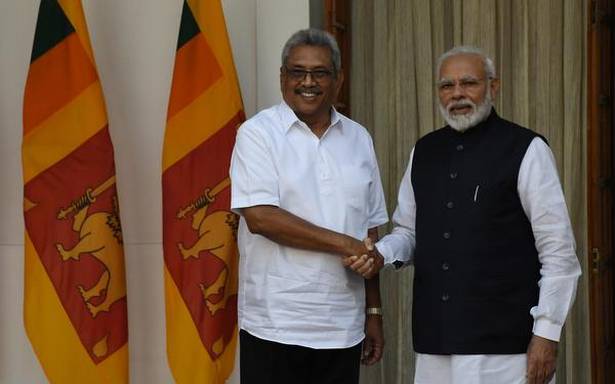Rajapaksa administration counting on friends and neighbours to support it
Sri Lankan President Gotabaya Rajapaksa and Prime Minister Narendra Modi reviewed “topical developments” during a telephone call on Saturday, an official press release said, just over a week before a crucial vote on Sri Lanka at the U.N. Human Rights Council, where Colombo has sought New Delhi’s support.
The call, initiated by the Sri Lankan side according to officials sources, assumes significance amid strained bilateral ties, following Colombo’s recent policy choices on key infrastructure projects, including a decision to boot India out of a Colombo Port terminal project and an approval for a Chinese energy project in the northern islands, close to the Tamil Nadu coast. New Delhi conveyed its displeasure on both moves. Colombo has subsequently offered an alternative terminal project and is negotiating with the Adani Group.
“Had a telephone conversation with President @GotabayaR. We discussed issues relevant to our bilateral and multilateral cooperation, including in the context of COVID-19,” PM Modi said in a tweet.
A media release issued by the Indian government said: “The leaders reviewed topical developments and the ongoing cooperation between both countries in bilateral and multilateral forums. They agreed to maintain regular contact between relevant officials, including in the context of the continuing COVID-19 challenges,” and added that PM Modi “reiterated the importance of Sri Lanka” to India’s ‘Neighbourhood First’ policy.
Also read: Sri Lanka ‘Priority One’ partner in defence: India
As the Human Rights Council prepares to vote on a resolution on Sri Lanka’s rights record later this month, the Rajapaksa administration is counting on friends and neighbours, who are currently members of the Council, to back it. President Rajapaksa earlier wrote to PM Modi, among other leaders, seeking a favourable vote. Reiterating Colombo’s expectation, Foreign Secretary Jayanath Colombage told The Hindu in a recent interview that “India cannot abandon us.”
It is widely predicted that India might abstain, given its own principle against country-specific resolutions and growing geopolitical concerns in the strategic island nation. All the same, those familiar with the Geneva process observe that India could still play a crucial role in last-minute negotiations among members of the Council, and potentially tip the scales.
Meanwhile, Indian High Commissioner Gopal Baglay who was in Jaffna on Saturday held discussions with Tamil MPs from different political parties.
Intervening in an interactive dialogue in February on the report by the Office of the United Nations High Commissioner for Human Rights noting that Sri Lanka is “on alarming path towards recurrence of grave human rights violations”, India’s Permanent Representative in Geneva made an unambiguous call to respect the rights of the Tamil community. “We believe that respecting the rights of the Tamil community, including through meaningful devolution, contributes directly to the unity and integrity of Sri Lanka,” Ambassador Indra Mani Pandey said.
China, which is also currently a member of the 47-member Council, has assured Sri Lanka of its support.
COVID-19 and economic assistance
Irrespective of how the Geneva vote goes, Colombo is faced with a major economic challenge, as it prepares to repay over $4 billion of its outstanding debt by next year. While Thursday’s media release said Mr. Modi and Mr. Rajapaksa discussed COVID-19 challenges — Sri Lanka’s first consignment of vaccines was a gift from India — it made no specific mention of economic assistance from India.
During his last call with PM Modi in May 2020, President Rajapaksa sought an additional $1 billion currency swap facility — the RBI extended $400 million — to boost the foreign reserves that are under enormous strain since the pandemic struck. India is yet to respond. Prime Minister Mahinda Rajapaksa’s debt freeze request made over a year ago, too, awaits New Delhi’s response.
Earlier this week, Sri Lanka said China approved a 10 billion yuan ($1.54 billion) currency swap. In March last year, China granted an ‘urgent’ $500 million loan to Sri Lanka to cope with the economic stress of the novel coronavirus. Colombo has sought a further $700 million loan from Beijing.
Source: Read Full Article

